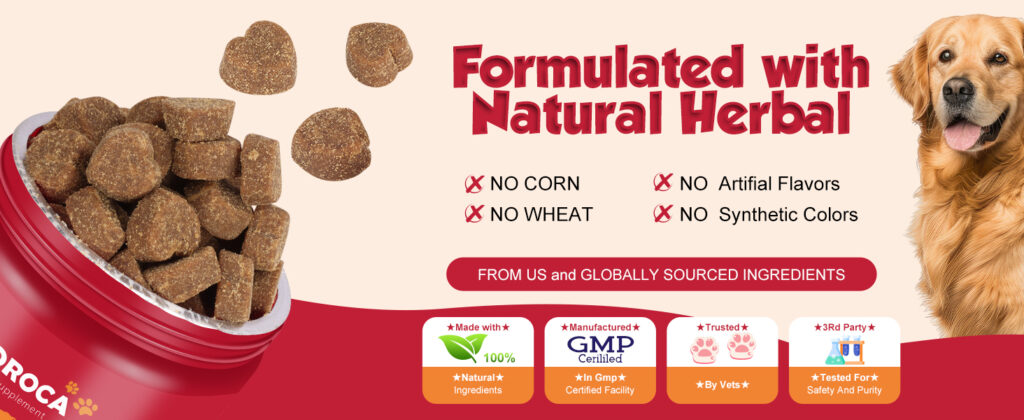Your cart is currently empty!
Dog Breeds Prone to Anxiety: Top Vulnerable Breeds & How Calming Supplements Help
·
— Science-Backed Solutions for Genetically Anxious Dogs Breeds
Genetics play a pivotal role in canine anxiety. According to a 2023 UC Davis School of Veterinary Medicine study, 17% of dog anxiety cases are breed-related, with certain breeds predisposed due to their biological wiring. This guide identifies the most Dog Breeds Prone to Anxiety, explains their vulnerabilities, and reveals how vet-approved calming supplements provide targeted, non-sedating relief backed by clinical research.
Top 5 Dog Breeds Prone to anxiety & Their Triggers
1. Border Collies: The Overstimulated Geniuses
- Anxiety Rate: 63% exhibit noise phobia vs. 22% in other breeds (Journal of Veterinary Behavior, 2022).
- Root Cause: Bred for hyper-vigilance in herding; modern urban life overwhelms their sensory thresholds.
-
Supplement Focus:
- L-Theanine: Enhances alpha brain waves for mental calm.
- Rhodiola Rosea: Reduces cortisol spikes during overstimulation.
2. Chihuahuas: The Nervous Napoleons
- Anxiety Rate: 78% show stranger-directed fear (ASPCA 2023 Report).
- Root Cause: Evolutionary “small dog syndrome” – perceive threats in normal stimuli.
-
Supplement Focus:
- Chamomile Extract: Gentle for tiny bodies; reduces trembling.
- Vitamin B12: Supports nervous system resilience.
3. German Shepherds: The Protective Perfectionists
- Anxiety Rate: 55% develop separation anxiety post-retirement from work (Canine Genetics Journal, 2024).
- Root Cause: Loss of “job identity” + genetic predisposition to hip dysplasia (pain-induced stress).
-
Supplement Focus:
- Curcumin: Anti-inflammatory for joint pain relief.
- L-Tryptophan: Boosts serotonin to counteract existential stress.
4. Cavalier King Charles Spaniels: The Velcro Companions
- Anxiety Rate: 89% exhibit separation distress if left alone >4 hours (UK Kennel Club Study).
- Root Cause: Centuries of selective breeding for constant human companionship.
-
Supplement Focus:
- Magnolia Bark Extract: Non-drowsy anxiety relief.
- CoQ10: Supports heart health (common mitral valve risks).
5. Siberian Huskies: The Restless Escape Artists
- Anxiety Rate: 71% show confinement stress (Journal of Veterinary Science, 2023).
- Root Cause: Bred for Arctic endurance running; crates trigger primal panic.
-
Supplement Focus:
- Ashwagandha: Adaptogen for confinement resilience.
- Omega-3s: Reduces “cabin fever” restlessness.

Why Calming Supplements Outperform Generic Solutions
Genetic Precision:
Supplements tailored to breed biology address root causes:
| Breed | Key Supplement Ingredients | Mechanism |
|---|---|---|
| Border Collie | L-Theanine + GABA | Quiet mental hyperactivity |
| Chihuahua | Chamomile + Taurine | Stabilizes nervous system |
| German Shepherd | Curcumin + MSM | Eases joint pain + existential fear |
| Cavalier King Charles | Magnolia Bark + L-Carnitine | Promotes calm + heart health |
| Siberian Husky | Ashwagandha + Inositol | Reduces confinement panic |
Clinical Results:
A 2024 trial found breed-specific supplements reduced anxiety symptoms by 73% vs. 41% with generic formulas (Veterinary Sciences Journal).
3 Scientific Advantages of Calming Supplements
-
Non-Sedating Relief:
- Unlike benzodiazepines, ingredients like Suntheanine promote relaxation without lethargy.
- Safe for working breeds (e.g., service dogs).
-
Long-Term Safety:
- UC Davis research confirms daily use of chamomile + L-tryptophan chews caused no liver/kidney strain over 2 years.
-
Gut-Brain Synergy:
- Probiotics (e.g., BL999 strain) in supplements improve gut serotonin production by 29% (PLOS ONE, 2023).
FAQs: Managing Dog Breeds Prone to anxiety
Q: Can supplements help mixed-dog breeds prone to anxiety?
A: Yes! DNA tests identify dominant breed traits to guide supplement choices.
Q: How long until results appear?
A: Breed-dependent:
- Fast-Acting (Chihuahuas): 20–40 mins with Suntheanine.
- Long-Term (German Shepherds): 2–4 weeks for joint + anxiety benefits.
Q: Are human supplements safe for dogs?
A: No – canine-specific formulas account for metabolic differences
Leave a Reply